| Listing 1 - 10 of 10 |
Sort by
|
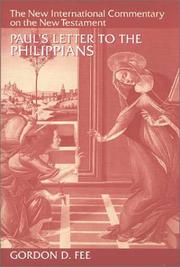
ISBN: 0802825117 9780802825117 Year: 1995 Publisher: Grand Rapids: Eerdmans,
Abstract | Keywords | Export | Availability | Bookmark
 Loading...
Loading...Choose an application
- Reference Manager
- EndNote
- RefWorks (Direct export to RefWorks)
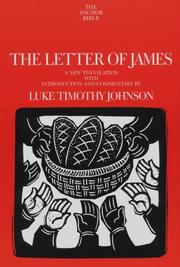
ISBN: 0385413602 9780300139907 9780385413602 Year: 1995 Volume: 37A Publisher: New York: Doubleday,
Abstract | Keywords | Export | Availability | Bookmark
 Loading...
Loading...Choose an application
- Reference Manager
- EndNote
- RefWorks (Direct export to RefWorks)
James is one of the most significant, yet generally overlooked, letters of the New Testament. Because Martin Luther, leader of the Protestant Reformation, disliked the book of James for its emphasis on good deeds, the book has come to be viewed in opposition to Paul's letters, which emphasize faith in God. To correct these and other misperceptions about James, Scripture scholar Luke Timothy Johnson embarks on a thorough history of the interpretation of this pivotal letter, which highlights the vast appreciation for James over the centuries. With respect to the question of who wrote the letter of James, Johnson boldly identifies the writer as none other than James, the brother of Jesus Christ. While modern skepticism casts doubt on this conclusion, early textual witnesses, as well as saints and scholars throughout the centuries, corroborate Johnson's position. A thorough examination of the original language texts and an explanation of the literary context of James helps illuminate the original meaning of the letter. In addition, Johnson offers the general reader insights into the letter's relevance for today.
Bible --- #GGSB: Exegese N.T. --- #GGSB: Tekstkritiek N.T. --- #GGSB: Katholieke brieven --- 227*2 --- Katholieke brieven --- Bible. --- Commentaries. --- 227*2 Katholieke brieven --- #GGSB: Exegese N.T --- #GGSB: Tekstkritiek N.T --- Epistle of James --- Epistle of St. James --- Jakobusbrief --- James, Epistle of --- Sobornoe poslanie Svi︠a︡togo Apostola Iakova --- Yagobo-sŏ (Book of the New Testament) --- Yagobosŏ --- Exegese N.T --- Tekstkritiek N.T
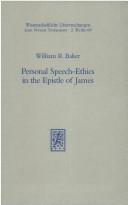
ISBN: 316145958X 9783161459580 Year: 1995 Volume: 68 Publisher: Tübingen: Mohr,
Abstract | Keywords | Export | Availability | Bookmark
 Loading...
Loading...Choose an application
- Reference Manager
- EndNote
- RefWorks (Direct export to RefWorks)
Speech --- Biblical teaching. --- Moral and ethical aspects --- History. --- 227*21 --- -Speech --- -Talking --- Language and languages --- Oral communication --- Phonetics --- Voice --- Brieven van Jacobus en Judas --- Biblical teaching --- -History --- -Brieven van Jacobus en Judas --- 227*21 Brieven van Jacobus en Judas --- -227*21 Brieven van Jacobus en Judas --- Talking --- Moral and ethical aspects&delete& --- History --- Bible. --- Epistle of James --- Epistle of St. James --- Jakobusbrief --- James, Epistle of --- Sobornoe poslanie Svi︠a︡togo Apostola Iakova --- Yagobo-sŏ (Book of the New Testament) --- Yagobosŏ --- Criticism, interpretation, etc. --- Speech - Biblical teaching. --- Speech - Moral and ethical aspects - History.
Book
ISBN: 3170136976 9783170136977 Year: 1995 Volume: 139 19 Publisher: Stuttgart: Kohlhammer,
Abstract | Keywords | Export | Availability | Bookmark
 Loading...
Loading...Choose an application
- Reference Manager
- EndNote
- RefWorks (Direct export to RefWorks)
Perfection --- Law (Theology) --- Judgment of God --- Biblical teaching. --- 227*21 --- -Law (Theology) --- -Perfection --- -Flawlessness --- Perfection (Philosophy) --- Perfectionism (Philosophy) --- Virtuosity --- Wholeness --- Mysticism --- Philosophy --- Excellence --- Imperfection --- God --- Brieven van Jacobus en Judas --- Biblical teaching --- Judgment --- -Brieven van Jacobus en Judas --- 227*21 Brieven van Jacobus en Judas --- -227*21 Brieven van Jacobus en Judas --- Flawlessness --- Bible. --- Epistle of James --- Epistle of St. James --- Jakobusbrief --- James, Epistle of --- Sobornoe poslanie Svi︠a︡togo Apostola Iakova --- Yagobo-sŏ (Book of the New Testament) --- Yagobosŏ --- Criticism, interpretation, etc. --- Theology. --- Perfection - Biblical teaching. --- Law (Theology) - Biblical teaching. --- Judgment of God - Biblical teaching.
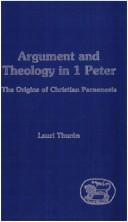
ISBN: 1850755469 9781850755463 Year: 1995 Volume: 114 Publisher: Sheffield: Sheffield academic press,
Abstract | Keywords | Export | Availability | Bookmark
 Loading...
Loading...Choose an application
- Reference Manager
- EndNote
- RefWorks (Direct export to RefWorks)
Bible --- Criticism, interpretation, etc --- 227*22 --- Brieven van Petrus --- 227*22 Brieven van Petrus --- Bible. --- Epistle of Peter, 1st --- Peter, 1st (Book of the New Testament) --- Peter (Book 1) --- Criticism, interpretation, etc.
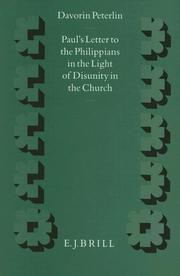
ISBN: 9004103058 9004267255 9789004267251 9789004103054 Year: 1995 Volume: 79 Publisher: Leiden ;New York E.J. Brill
Abstract | Keywords | Export | Availability | Bookmark
 Loading...
Loading...Choose an application
- Reference Manager
- EndNote
- RefWorks (Direct export to RefWorks)
This volume discusses the development of disunity in the Philippian church as the occasion for Paul's response in his letter. The first part of the book examines references and allusions to strife among the Philippians and tension between them and Paul. It demonstrates the pervasiveness of the theme of disunity in most sections of the letter. The second part correlates these findings with sections of the letter dealing with the Philippians' financial support for Paul. It treats such topics as Paul's attitude to money and the sociological composition of the church. The book's aim is to draw attention to social and non-theological aspects of the Philippian situation, and make a contribution to a more theological study of Philippians.
Church controversies --- Church disputes --- Conflicten [Kerkelijke ] --- Conflicts [Church ] --- Conflits ecclésiastiques --- Conflits religieux --- Controversen [Kerkelijke ] --- Controverses ecclésiastiques --- Controverses religieuses --- Controverses théologiques --- Controversies [Church ] --- Disputen [Kerkelijke ] --- Disputes ecclésiastiques --- Débats religieux --- Fights [Church ] --- Kerkelijke conflicten --- Kerkelijke controversen --- Kerkelijke disputen --- Luttes religieuses --- Querelles religieuses --- Bible. --- Criticism, interpretation, etc --- Critique, interprétation, etc. --- Church controversies. --- Church conflicts --- Church fights --- Conflicts, Church --- Controversies, Church --- Fights, Church --- Church management --- Religious disputations --- Criticism, interpretation, etc. --- Critique, interprétation, etc. --- Epistle of Paul to the Philippians --- Epistle to the Philippians --- Letter of Paul to the Philippians --- Philippians --- Pillipo (Book of the New Testament) --- Bible. Philippians --- Bible. - N.T. - Philippians - Criticism, interpretation, etc.
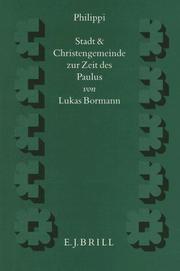
ISBN: 9004102329 9004267247 9789004267244 9789004102323 Year: 1995 Volume: 78 Publisher: Leiden ;New York E.J. Brill
Abstract | Keywords | Export | Availability | Bookmark
 Loading...
Loading...Choose an application
- Reference Manager
- EndNote
- RefWorks (Direct export to RefWorks)
The Roman colony of Philippi is the site upon which Paul founded his first European congregation. There, he encountered a political entity which bore the stamp of Roman culture through and through. Part I describes Philippi's political and religious situation based on numismatic, epigraphical, archaeological and literary sources. Part II reconstructs the relationship between Paul, the congregation, and the city of Philippi, and demonstrates the influence which the Roman environment exerted on the church's organization and preaching. The work reaches the conclusion that the Philippean community assumed an active and self-confident role in implementing its mission. In so doing, it clashed with the Roman authorities and their insistence upon a religious praxis that did not call into question the principles or existence of the Roman State. The book contributes to the interpretation of the Epistle to the Philippians as well as to the history of early Christianity and the history of Religions during the first century.
Excavations (Archaeology) --- Fouilles (Archéologie) --- Bible. --- Criticism, interpretation, etc --- Critique, interprétation, etc. --- Philippi (Extinct city) --- Philippes (Ville ancienne) --- Church history --- History --- Histoire religieuse --- 227.1*5 --- -Archaeological digs --- Archaeological excavations --- Digs (Archaeology) --- Excavation sites (Archaeology) --- Ruins --- Sites, Excavation (Archaeology) --- Archaeology --- Brief van Paulus aan de Filippenzen --- Crenides (Extinct city) --- Fílippoi (Extinct city) --- Krenides (Extinct city) --- Philippes (Extinct city) --- Philippi (City) --- Philippoi (Extinct city) --- Greece --- Church history. --- History. --- Antiquities --- Theses --- -Brief van Paulus aan de Filippenzen --- 227.1*5 Brief van Paulus aan de Filippenzen --- -227.1*5 Brief van Paulus aan de Filippenzen --- Archaeological digs --- Fouilles (Archéologie) --- Criticism, interpretation, etc. --- Critique, interprétation, etc. --- Epistle of Paul to the Philippians --- Epistle to the Philippians --- Letter of Paul to the Philippians --- Philippians --- Pillipo (Book of the New Testament) --- Philippoi (Greece : Extinct city) --- Bible. Philippians --- Christianity --- Primitive and early church, ca. 30-600 A.D. --- Pillipo (Bible of the New Testament) --- Europe --- Excavations (Archaeology) - Greece - Philippi (Extinct city)
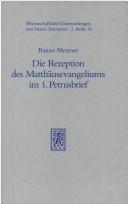
ISBN: 3161463781 9783161463785 Year: 1995 Volume: 74 Publisher: Tübingen: Mohr,
Abstract | Keywords | Export | Availability | Bookmark
 Loading...
Loading...Choose an application
- Reference Manager
- EndNote
- RefWorks (Direct export to RefWorks)
Bible --- Relation to Peter --- Relation to Matthew --- 227*22 --- Brieven van Petrus --- 227*22 Brieven van Petrus --- Bible. --- Epistle of Peter, 1st --- Peter, 1st (Book of the New Testament) --- Peter (Book 1) --- Evangelie volgens Matteus --- Evangelie volgens Matthéüs --- Matʻae pogŭm --- Matai den --- Matai ni yoru fukuinsho --- Matius (Book of the New Testament) --- Mattá --- Matteo (Book of the New Testament) --- Matteus --- Matthäusevangelium --- Matthéüs --- Matthew (Book of the New Testament) --- Matthieu (Book of the New Testament) --- Relation to Peter. --- Relation to Matthew.
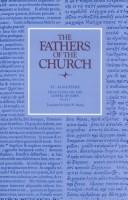
ISBN: 0813211921 9780813211923 9780813200927 081320092X 081320092X Year: 1995 Publisher: Washington, D.C. : Catholic University of America Press,
Abstract | Keywords | Export | Availability | Bookmark
 Loading...
Loading...Choose an application
- Reference Manager
- EndNote
- RefWorks (Direct export to RefWorks)
Sermons, Latin --- Latin sermons --- Bible. --- 1st Epistle of John (Book of the New Testament) --- Jean (Book of the New Testament) --- Johanisi (Book of the New Testament) --- Johannesevangelium --- John (Book of the New Testament) --- Yohan pogŭm --- Yohane den (Book of the New Testament) --- Yūḥannā (Book of the New Testament) --- 226.5 --- #GOSA:II.P.AU.2.O --- #GROL:SEMI-276<08> Fath 92 --- Evangelie volgens Johannes --- Sermons, English --- English sermons --- Translations from Latin --- Sermons --- Ioganaĭ (Book of the New Testament) --- Иоганай (Book of the New Testament)
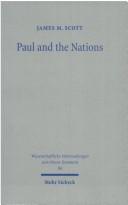
ISBN: 3161463773 9783161463778 Year: 1995 Volume: 84 Publisher: Tübingen: Mohr,
Abstract | Keywords | Export | Availability | Bookmark
 Loading...
Loading...Choose an application
- Reference Manager
- EndNote
- RefWorks (Direct export to RefWorks)
"How does Paul view the geography and ethnography of the world? Which 'map' is the apostle using? When he thinks, for example, of Galatia and the Galatians, how does he integrate them into his imago mundi? Scott shows the geographical horizon of Paul's missionary strategy."--BOOK JACKET.
Geography, Ancient.
---
Ethnology in the Bible.
---
266.1*31
---
227.1*3
---
Ethnology in the Bible
---
Geography, Ancient
---
Ancient geography
---
Geography
---
Systematische missietheologie en de bijbel
---
Brief van Paulus aan de Galaten
---
Paul the Apostle, Saint
---
-Criticism and interpretation
---
227.1*3 Brief van Paulus aan de Galaten
---
266.1*31 Systematische missietheologie en de bijbel
---
Geography.
---
Brieven van Paulus.
---
Volken.
---
Mission.
---
Missionstheologie.
---
Rezeption.
---
Volk.
---
Weltbild.
---
Missions
---
Géographie antique.
---
Aspect religieux
---
Histoire
---
Thèses
---
Paul,
---
Paulus,
---
Paulus
| Listing 1 - 10 of 10 |
Sort by
|

 Search
Search Feedback
Feedback About UniCat
About UniCat  Help
Help News
News